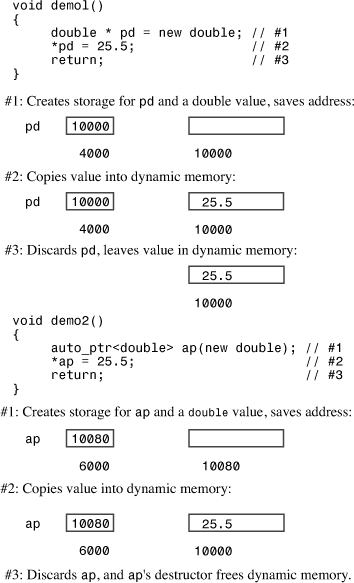Using Smart Pointers
These three smart pointer templates (auto_ptr, unique_ptr, and shared_ptr ) each defines a pointer-like object intended to be assigned an address obtained (directly or indirectly) by new. When the smart pointer expires, its destructor uses delete to free the memory. Thus, if you assign an address returned by new to one of these objects, you don’t have to remember to free the memory later; it will be freed automatically when the smart pointer object expires. Figure 16.2 illustrates the behavioral difference between auto_ptr and a regular pointer. The shared_ptr and unique_ptr share the same behavior in this situation.
Figure 16.2. A regular pointer versus auto_ptr.

To create one of these smart pointer objects, you include the memory header file, which includes the template definitions. Then you use the usual template syntax to instantiate the kind of pointer you require. The auto_ptr template, for instance, includes the following constructor:
template<class X> class auto_ptr {
public:
explicit auto_ptr(X* p =0) throw();
...};
(The throw() notation, recall, means this constructor doesn’t throw an exception. Like auto_ptr, it is deprecated.) Thus, asking for an auto_ptr object of type X gives you an auto_ptr object that points to type X:
auto_ptr<double> pd(new double); // pd an auto_ptr to double
// (use in place of double * pd)
auto_ptr<string> ps(new string); // ps an auto_ptr to string
// (use in place of string * ps)
Here new double is a pointer returned by new to a newly allocated chunk of memory. It is the argument to the auto_ptr<double> constructor; that is, it is the actual argument corresponding to the formal parameter p in the prototype. Similarly, new string is also an actual argument for a constructor. The other two smart pointers use the same syntax:
unique_ptr<double> pdu(new double); // pdu an unique_ptr to double
shared_ptr<string> pss(new string); // pss a shared_ptr to string
Thus, to convert the remodel() function, you would follow these three steps:
1. Include the memory header file.
2. Replace the pointer-to-string with a smart pointer object that points to string.
3. Remove the delete statement.
Here’s the function with those changes made using auto_ptr:
#include <memory>
void remodel(std::string & str)
{
std::auto_ptr<std::string> ps (new std::string(str));
...
if (weird_thing())
throw exception();
str = *ps;
// delete ps; NO LONGER NEEDED
return;
}
Note that smart pointers belong to the std namespace. Listing 16.5 presents a simple program using all three of these smart pointers. (Your compiler will need to support the C++11 shared_ptr and unique_ptr classes.) Each use is placed inside a block so that the pointer expires when execution leaves the block. The Report class uses verbose methods to report when an object is created or destroyed.
// smrtptrs.cpp -- using three kinds of smart pointers
// requires support of C++11 shared_ptr and unique_ptr
#include <iostream>
#include <string>
#include <memory>
class Report
{
private:
std::string str;
public:
Report(const std::string s) : str(s)
{ std::cout << "Object created!
"; }
~Report() { std::cout << "Object deleted!
"; }
void comment() const { std::cout << str << "
"; }
};
int main()
{
{
std::auto_ptr<Report> ps (new Report("using auto_ptr"));
ps->comment(); // use -> to invoke a member function
}
{
std::shared_ptr<Report> ps (new Report("using shared_ptr"));
ps->comment();
}
{
std::unique_ptr<Report> ps (new Report("using unique_ptr"));
ps->comment();
}
return 0;
}
Object created!
using auto_ptr
Object deleted!
Object created!
using shared_ptr
Object deleted!
Object created!
using unique_ptr
Object deleted!
Each of these classes has an explicit constructor taking a pointer as an argument. Thus, there is no automatic type cast from a pointer to a smart pointer object:
shared_ptr<double> pd;
double *p_reg = new double;
pd = p_reg; // not allowed (implicit conversion)
pd = shared_ptr<double>(p_reg); // allowed (explicit conversion
shared_ptr<double> pshared = p_reg; // not allowed (implicit conversion)
shared_ptr<double> pshared(p_reg); // allowed (explicit conversion)
The smart pointer template classes are defined so that in most respects a smart pointer object acts like a regular pointer. For example, given that ps is a smart pointer object, you can dereference it (*ps), use it to access structure members (ps->puffIndex), and assign it to a regular pointer that points to the same type. You can also assign one smart pointer object to another of the same type, but that raises an issue that the next section faces.
But first, here’s something you should avoid with all three of these smart pointers:
string vacation("I wandered lonely as a cloud.");
shared_ptr<string> pvac(&vacation); // NO!
When pvac expires, the program would apply the delete operator to non-heap memory, which is wrong.
If Listing 16.5 represents the pinnacle of your programming aspirations, any of these three smart pointers will serve your purposes. But there is more to the story.
